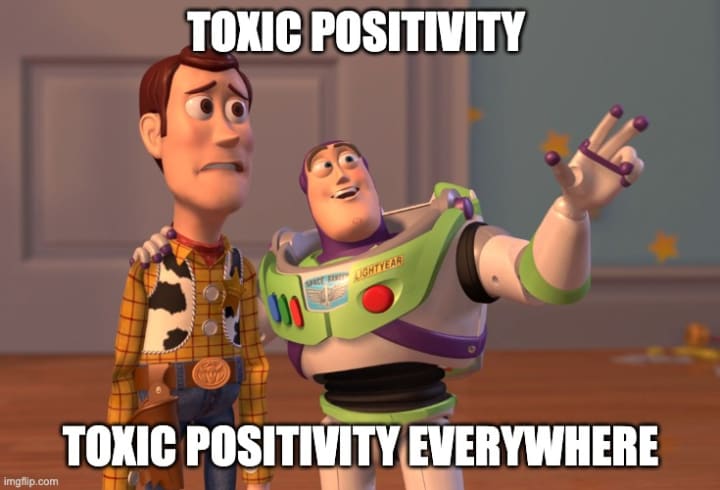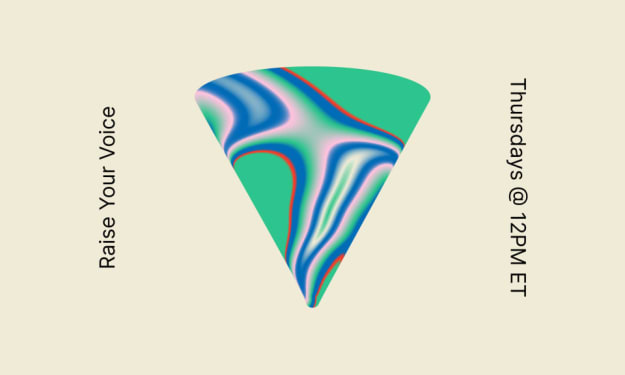The Problematic Case of Toxic Positivity
Why being supportive to friends, families, work colleagues, and strangers is far better than positivity.

It's circa 2012.
My boyfriend of 2.7 years has just decided to call it quits and I am now covered in cookie-crumbs, blankets and tears.
Across the living room, my girlie is staring at me with a concerned look on her face as I cry-eat my despair and unashamedly exclaim how much I miss him. Suddenly she says:
"Hey, don't even worry about it hun. There's plenty more fish in the sea."
I look at her, wipe my tears and force a smile. She's right after all... I think. My girlie crosses the room and gives me a massive hug. After a moment of silence. I change the subject.
ENTER THE WORLD OF ✨ TOXIC POSITIVITY ✨
Now, some may wonder: how can positivity be toxic? You're absolutely right to question this. The two words shouldn't appear in the same sentence like some riddle or poetic juxtaposition, but it's a real thing my friend and we absolutely need to talk about.
Not to be confused with being optimistic, which is the act of being confident and/or hopeful that better days are ahead of us, toxic positivity is a situation whereby we express unsolicited and dismissive jolly statements when an individual, or group of people simply want you to be there for them.
Most of us love our friends and family dearly, and as a society, we don't want anyone to go through any form of struggle and sadness. So whether it's your friend, family, work colleague or even a stranger, when we know someone is having a bad time, naturally we want to support them.
To aid ourselves in the act of supporting others, we may say things such as:
"it could be worse"
as a way to minimise the impact of the struggle, or:
"everything happens for a reason"
to describe that while the struggle may be relentless, life is an organic wheel of fate, failure and fortune - there was nothing more, nothing less, or nothing different you could have done to prevent the inevitable.
Unfortunately, our well-intentioned encouragement creates a problem for the individual, or group of people who are suffering. It removes the ability to be present, reflect, and make peace with their pain in their own time, and instead, they must make peace with their pain based on our own timeline.

As the legendary Buzz Lightyear points out, toxic positivity is everywhere.
Many of us have done it - I know I have more times than I can count. It's scattered across our social media, within our social settings, in the workplace, on the small and big screen, within song lyrics, and even on our t-shirts.

It's ingrained in our psyche that happiness is a choice and when life gives you lemons, you make the best fan-diddly scrumptious lemonade this side of the universe has ever seen.
However, thinking in this way and expressing this in an attempt to comfort someone, or even to comfort yourself is not helpful. In fact, it is very unhelpful.
Below I've picked some examples of toxic positivity phrases that many of us may be familiar with. Let's check them out and see what we can say instead that may offer a more empathetic safe environment and sensitive support.
You Only Live Once (or what urban dictionary calls YOLO)
The scenario:
A friend has come to you and expressed that they feel unfulfilled with their current life. Your friend has seen what other people do with their lives and has determined that they are wasting their time on earth by not doing more.
During this conversation we may respond with a phrase such as:
What we think we are saying:
❤️ Step out of your comfort zone and go live your best life.
❤️ Live every day like it was your last day.
❤️ Even if you think it's a bad idea, don't worry about it, because YOLO!!!
❤️ Time waits for no-one, so go out there and see the world.
Why this is a form of toxic positivity:
🖤 Living in your comfort zone is not good enough for you or anyone else.
🖤 What you're doing at the moment is not exciting enough, do more.
🖤 Destructive behaviour is fine, because YOLO!!!
🖤 A life of regret if you don't have and complete your bucket list.
How to create an empathetic environment and provide sensitive support:
It is important for us to understand and accept that what we consider happiness and fulfilment in life differ from person to person. While some of us enjoy white water rafting or skydiving, others may prefer reading a book or watching tv. It's also possible to enjoy all the exhilarating antidotes as well as steady-paced routine. The way we live our lives does not hold higher value depending on the activity.
With this in mind, if you ever find yourself in a circumstance where someone does feel unfulfilled, always ask them what has caused them to feel this way. This allows the individual the safe space to express their thought-processes without judgement.
Whether there is something specific they want to do, or a general feeling of unfulfillment, ask them with sincerity if there is anything you can do to support them. Be there for them, and let them know that not having it all figured out is more than okay. Equally, let them know that if the life they already have makes them happy, that is not only more than okay, it's also all that matters.
It's A Thankless Job
The scenario:
Your colleague has been working hard for weeks to create a sales performance report that your mutual boss will use as part of their presentation to the board of directors. Your colleague has been visibly stressed throughout this task but is proud of their work and emails the report over. Your colleague never receives a response from the boss and it's made them upset.
During this conversation we may respond with a phrase such as:
What we think we are saying:
❤️ It's expected because they know that we are skilled enough to do it.
❤️ They thank us by paying us.
❤️ It goes without saying, but I'm sure they are grateful.
❤️ They're just like that.
Why this is a form of toxic positivity:
🖤 A person's nature and/or skillset causes undesirable outcomes.
🖤 Encourages guilty emotions.
🖤 Normalises the absence of expressing gratitude.
🖤 Makes excuses for bad etiquette.
How to create an empathetic environment and provide sensitive support:
Expressing gratitude is a necessary part of being a good person. When someone or a group of people use their own time, effort, and abilities to do something big or small to make your life easier in some shape or another, it is highly important that we at the very least say thank you (and mean it).
While the human brain is a very capable and incredible biological beauty, we unfortunately are not mind readers. Therefore, being vocally and genuinely grateful to any effort, whether the effort is expected or not, reinstates the fact that you appreciate and value the individual or group of people.
With this in mind, we must strive to avoid this phrase under all circumstance in favour of encouraging recognition and thanks within society. The blame is never on the person looking for appreciation of their efforts, and we don't always know the lengths someone has gone to make something happen for you. Even a simple thank you creates a wholesome and connected feeling when we express appreciation.
What Doesn't Kill You Makes You Stronger
The scenario:
A family member is struggling financially due to increasing living costs. As a result, they have taken on a second job. They now have more money than they've ever seen and their bills are paid on time, but they can't help but feel miserable about the current situation that they are in, and how it is impacting other areas of their life.
During this conversation we may respond with a phrase such as:
What we think we are saying:
❤️ You're improving your resilience to stressful situations.
❤️ It could be much worse.
❤️ You'll come out the other end just fine.
❤️ Be grateful that it happened because it will make you a better person.
Why this is a form of toxic positivity:
🖤 Feelings of failure if you are regularly sensitive to the struggle.
🖤 Undermines pain and encourages guilt that other problems are greater.
🖤 Unwilling to seek personal and/or professional help if it's impacting life.
🖤 Dismisses struggle in favour of everything happening for a reason.
How to create an empathetic environment and provide sensitive support:
There is a tendency to measure a person's struggle based on the specific issue at hand in comparison to other issues around the world that may trigger sadness. Depending on the specific issue, we may empathise that the problem is bad, but not bad enough to impact them long term - hence the phrase. However, it is the reverse that is true. Regardless of the problem at hand, it's the individual's, or group of people's reaction to the issue and how severely that issue has impacted them and their daily life that identifies how much they are struggling.
We must be conscious that what we may not perceive to be a problem, may absolutely be a debilitating problem for others; whether mentally, physically, emotionally, or a mixture of all three.
With this in mind, being a good listener is always the first step in providing empathetic and kind support. Letting someone know that you will be there for them throughout their struggle, no matter how long it takes, normalises the notion that we all have our own timelines to process issues. If such a situation occurs whereby someone does not fully recover from their struggle, despite appearing as a high-functioning person in everyday life, we must accept them, and express love, sincere patience, and kindness towards them without any change or reservation, because ultimately, bad things (big and small) do happen to people that may affect them for the rest of their lives in ways we never would have known.
Final Thought
Most of us in this world are good, honest, and loving human beings. We strive to make meaningful connections with everyone we meet and feel sincere sadness when others are hurting.
This is why the topic of toxic positivity must be carefully considered, so that we can help our friends, families, work colleagues, and strangers in a way that conveys a safe and empathetic environment and sensitive support to allow anyone who is struggling a way to express that hurt without external and/or internal repercussions.
By providing a safe and empathetic environment and sensitive support during these circumstances, it also allows our friends, families, work colleagues and strangers the opportunity to heal - in their own time.
About the Creator
Fiona Teddy-Jimoh
Finding innovative ways to connect creative writing with technology in order to deliver an immersive digital experience.
My name is Fiona Teddy-Jimoh and welcome to my world.
Reader insights
Outstanding
Excellent work. Looking forward to reading more!
Top insights
On-point and relevant
Writing reflected the title & theme
Heartfelt and relatable
The story invoked strong personal emotions
Eye opening
Niche topic & fresh perspectives
Easy to read and follow
Well-structured & engaging content
Expert insights and opinions
Arguments were carefully researched and presented
Masterful proofreading
Zero grammar & spelling mistakes
Compelling and original writing
Creative use of language & vocab
Excellent storytelling
Original narrative & well developed characters







Comments (9)
I like the way you present this topic
Thank you!!! I am so grateful you shared this.
Very insightful thank you for sharing. Some of these I’ve thought about before but others I hadn’t realized were toxic in their own ways. Makes me rethink how to give helpful advice to friends!
Perfection is a means and not an end. This mindset has helped me succumbing into a ruinous cycle of self actualization
A great article !
This comment has been deleted
Amazing Article. very informative
awesome article
Very well written!
I resonate with your ideas so well. I’ve always found that empathy and support go a long way. Shutting down my pain to remain positive has never worked well, but processing and reflecting on it has always done wonders. I appreciate you touching upon this!